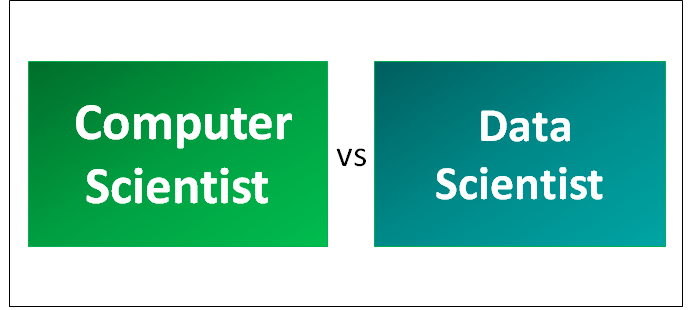Updated June 14, 2023
Difference Between a Computer Scientist and Data Scientist
Computer Science is an approach to systematically studying algorithms, processing, communication, storage, etc. Computer scientists, thus, must be adept at analyzing and modeling problems. He is also expected to have a firm foundation in the crucial areas and in-depth knowledge in one or more areas of the discipline. It’s a science and technique of problem-solving. Data scientists, on the other hand, are expected to know various scientific methods, algorithms, and processes to extract knowledge and information from data in various forms which can be either structured or unstructured. The concept is quite similar to data mining which uses meta keywords to extract the relevant information.
Let us study more about Computer Scientists and Data Scientists in detail
Computer Science deals with theory, experimentation that forms the basis for the design and use of computers. Computer scientists have a wide range of specialties, such as being proficient in understanding architectures, software systems, artificial intelligence, computational science, graphics, and software engineering.
As data science is known to be a concept of unifying statistics, machine learning, data analytics, and their related methods, data scientists are expected to derive and generate meaningful data from the already processed data to provide businesses with future insights, risk predictions, and ways of risk mitigation.
Head To Head Comparision Between Computer Scientists vs Data Scientists (Infographics)
Below is the Top 7 Comparision Between Computer Scientist vs Data Scientist
Key differences between Computer Scientist and Data Scientist
Following is the Difference Between Computer Scientist and Data Scientist are as follows
- A computer scientist aims to simplify problems and classify them into smaller chunks. In contrast, a data scientist will tackle the problems from a business standpoint and dive deep into the data analytics lifecycle.
- A computer scientist then uses a classification algorithm and improves it to meet the problem statement, which can be done by devising a new architecture or playing with regularization methods. In contrast, a data scientist uses techniques like cleaning datasets, normalizing, imputing missing, statistical testing, cross-validation, fitting models, etc.
- A computer scientist applies the concepts of computation, computer design, and algorithms to a specific design problem. In contrast, a data scientist applies the ones emerging from machine learning, classification, uncertainty classification, cluster analysis, computational science, databases, data mining, data visualization, statistics, mathematics, information science and also computer science.
Computer Scientist vs Data Scientist Comparision Table
| Basis of Comparison | Computer Scientist | Data Scientist |
| Primary Responsibility | They are known to shape the science of technology | They are known to discover the meaning of big data |
| Skillset | My Skillset includes Advanced computing, and in-depth experience in creating and building enterprise-scale applications, security solutions, database systems, and automated systems. | Expected to be knowledgeable in mathematics and computer science so that large data collections can be analyzed using data mining, predictive analysis, data visualization, and efficient data management. |
| What they do | Responsible for developing next-gen technology in computer software, cybersecurity, and smart systems | Expected to be SMEs (Subject Matter Experts) in one or more skills. The discipline will be used to clarify the relevance and usage of large data sets and therefore enhance organizational decision-making can be fostered. |
| Why are they important | They are the prime movers and drivers of today’s technological inventions | Data is one of the most crucial aspects of a company, and the sheer quantity of it requires experts to process and transform that raw data into meaningful information. |
| Potential Salary (approx.) | Ranges from $68,665 to $146,810 across the range of professionals | The median expected salary for big data professionals is $124,000 per annum |
| Applications |
|
|
| Other potential careers |
|
|
Conclusion
Both these Difference Between Computer Scientist and Data Scientist streams have their own set of roles and responsibilities to be taken care of, and they both aim to make the world a better place. If you want to pursue a career in any of these, now you know which one to choose.
Stay tuned to our blog for more articles.
Recommended Article
This has been a guide to Computer Scientist vs Data Scientist. Here we discuss head-to-head comparison, key differences, and comparison tables. You may also look at the following articles to learn more –




